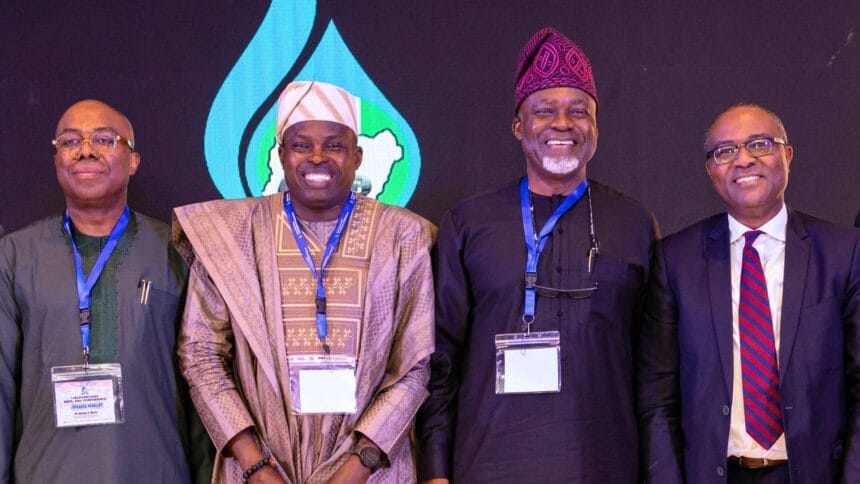NMDPRA challenges gas marketers to take advantage MDGIF for infrastructure projects
Oredola Adeola
Rt. Hon. Ekperikpe Ekpo, Minister of State for Petroleum Resources (Gas), and Olu Verheijen, Special Adviser to the President on Energy, have reiterated the government’s commitment to driving investment, infrastructure expansion, and policy support to ensure the affordability, stability, and broad adoption of cooking gas as part of Nigeria’s energy transition.
The Minister of State for Petroleum Resources (Gas), who was represented by Abel Nsa, Senior Technical Adviser to the Minister, made this remark at the Nigerian Association of Liquefied Petroleum Gas Marketers (NALPGAM) 2024 National Conference in Lagos, themed ‘Sustainable Energy Growth in Nigeria – LPG and the Future’, held on Wednesday, in Lagos.
Rt Hon. Ekpo, in his comment highlighted Nigeria’s commitment to the Decade of Gas initiative, which aims to drive increased gas penetration and utilization as part of the country’s strategy for sustained economic growth.
“LPG is central to President Bola Tinubu’s agenda,” Ekpo stated, noting that with over 200 trillion cubic feet (TCF) of proven gas reserves, Nigeria has the potential to be a leading global player in the production of liquefied natural gas (LNG).
The Minister emphasized that expanding LPG usage could significantly reduce the country’s reliance on biomass for cooking, improve public health, particularly for rural communities, and contribute to economic growth.
He noted that the government’s target is to increase LPG consumption to 5 million metric tonnes per annum by 2030, a goal that can be achieved through infrastructure development, market stability, and policies that incentivize investment in the LPG value chain.
“The demand for LPG is growing, and it offers immediate and long-term benefits for Nigeria’s energy transition and security,” he said, pointing out that increasing LPG usage would alleviate pressure on other energy resources and shield the country from global market volatility.
Ekpo further disclosed that the government has initiated LPG cylinder distribution under the Decade of Gas initiative, with a target to transition 250,000 homes to clean cooking over the next 10 years.
He also revealed that the Nigerian Midstream and Downstream Petroleum Regulatory Authority (NMDPRA) has been directed to create a pricing framework that reflects local production, to ensure market stability and affordability.
Olu Verheijen, Special Adviser to the President on Energy, in her speech, during the conference, underscored the critical role of LPG in achieving Sustainable Development Goal 7 (SDG 7), which aims for universal access to affordable, reliable, and sustainable energy.
Verheijen affirmed the Federal Government’s commitment to mainstreaming LPG use as a vital tool for reducing poverty and improving public health.
She praised NALPGAM for its role in influencing government policy, noting that feedback from the association has been instrumental in shaping reforms in the LPG value chain.
One such policy, she said, was the waiver of import duties and VAT on LPG products approved by President Tinubu in November 2023, aimed at reducing prices and encouraging investment.
Verheijen stressed that addressing issues of affordability, access, and infrastructure in the LPG sector is crucial, particularly for rural communities.
“We have a responsibility to provide clean and affordable LPG for all Nigerians, regardless of social status,” she said, calling for stronger public-private partnerships to scale up adoption.
Engr. Farouk Ahmed, Authority Chief Executive, who was represented by Mr. Ogbuhe Ukoha, Executive Director, Distribution Systems, Storage and Retailing Infrastructure at NMDPRA, in his regulatory address revealed that LPG storage capacity has increased by 60 percent since 2021 in Nigeria, challenging NALPGAM members to take advantage of the N122 billion MDGIF for infrastructure projects.
He also explained that the expansion not only aims to improve gas supply but also supports Nigeria’s broader goal of transitioning to cleaner energy, thereby creating employment opportunities and boosting economic growth.
Ukoha has further emphasized the importance of infrastructure investment to support Nigeria’s energy goals.
He highlighted the Midstream and Downstream Infrastructure Fund (MDGIF), created under the Petroleum Industry Act (PIA), which is focused on eliminating gas flaring and expanding gas processing infrastructure.
Ukoha urged NALPGAM members to take advantage of the MDGIF for infrastructure projects and mentioned that six companies had already benefited from the fund.
He also called attention to the rising prices of LPG, driven by global factors such as the Israel-Iran/Palestine conflict and exchange rate fluctuations, noting that the government is working to stabilize the market.
He pointed out that more infrastructure is needed to process propane produced by international oil companies, such as Chevron, to meet local demand.
“We need significant investments in infrastructure, such as mother stations, daughter stations, and blending facilities, to ensure that LPG produced locally is consumed locally,” Ukoha added.
He concluded by stating that the government is committed to reducing LPG imports and increasing local production but stressed that this would take time, calling for continued collaboration between stakeholders to address pricing and foreign exchange issues.




